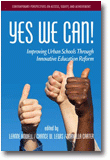
Yes We Can!
Improving Urban Schools through Innovative Educational Reform
Edited by:
Leanne L. Howell, Baylor University
Chance W. Lewis, University of North Carolina at Charlotte
Norvella Carter, Texas A&M
A volume in the series: Contemporary Perspectives on Access, Equity, and Achievement. Editor(s): Chance W. Lewis, University of North Carolina at Charlotte.
Published 2011
Yes We Can: Improving Urban Schools through Innovative Educational Reform is a empirically-based book on urban education reform to not only proclaim that hope is alive for urban schools, but to also produce a body of literature that examines current practices and then offer practical implications for all involved in this arduous task. This book is filled with real-world strategies to implement in your quest to inspire and bring about reform. Additionally, we hope that you garner hope from the school personnel, school campuses, and school resources used as examples within the body of this work.
We offer this book to all stakeholders who find themselves associated with urban schools: teachers, administrators, parents and even students. Consider this book an empirically based roadmap as you consider being a part of this transformation. We hope that it not only inspire you to adopt the“Yes We Can” spirit, but also empower you to be the beacon of light for urban students whose very future relies on people like you to keep the torch alive.
CONTENTS
Prologue: Hope Is Alive! Envisioning the Future Possibilities of Urban Schools, Leanne L. Howell and Chance W. Lewis. PART I: ENVIRONMENTS OF URBAN SCHOOL REFORM SECTION I: TRADITIONAL AND CHARTER SCHOOL SETTINGS: SUCCESS AND SUSTAINABLE CHANGE. Yes We Can—Even in Detroit: Quality Education, High Academic Achievement, and Service-Learning, Robert W. Simmons III and Robert D. Carpenter. Texarkana Independent School District: Blazing a Trail for Urban Learners, Molly S. Taylor. SECTION 2: URBAN COMMUNITY INITIATIVES AND SUPPORT STRUCTURES. Examining Influences on African American High School Students’ Mathematics Achievement, Lamont A. Flowers and Tiffany A. Flowers. Mental Health Delivery in Urban Schools: It Takes a Village to Empower a Child, Jamilia Blake, Collette Nero, and Concepcion M. Rodriguez. PART II: EMPOWERING URBAN STUDENTS AND TRANSFORMING THEIR SCHOOLS. SECTION 1: TEACHERS’ ROLES IN URBAN SCHOOL SETTINGS. Deconstructing Teacher Bias: Exploring Attributional Bias in Urban Elementary Schools, Stephen D. Hancock and Tehia V. Starker. Going Beyond Parental Involvement: Parent Perceptions of Teacher Support and Its Influence on the Achievement Outcomes of Urban African American High School Adolescents, DeMarquis Hayes. SECTION 2: CULTURALLY RESPONSIVE PEDAGOGIES AND CURRICULUM FOR URBAN SCHOOL REFORM. Beyond Lip Service: Engaging Young African American Men in a Single-Gender Urban School, Ryan Vernosh and Julie Landsman. Montessori: Education for Life, Michelle J. Moody and Ginny Riga. Making a Case to LEARN: Linking Emphasis on the Achievement and Reporting Needs of African American Females on NAPE Test Results, Patricia J. Larke, Jemima L. Young, and Jamaal Young. SECTION 3: POLICIES, POLITICS, AND URBAN SCHOOL REFORM. A Closer Look at Media Influences, Identity Formation, and Educational Policy: Implications for African American Male Students, Meredith B. Walker and Bettie Ray Butler. Two Steps Forward, One Step Back: A Brief Fifty-Year Overview of Educational Finance, Politics and Policy Influencing Urban Districts, Schools and Students, Augustina ozano and Anthony Rolle. EPILOGUE: Capitalizing on Our Inspiration of Hope to Make Sustainable Reform in Urban Schools, Leanne L. Howell and Chance W. Lewis. About the Editors, About the Authors.
-
Paperback978-1-61735-635-3
Web price: $45.04 (Reg. 52.99)
-
Hardcover978-1-61735-636-0
Web price: $80.74 (Reg. 94.99)
- eBook978-1-61735-637-7

- EDU001000 - EDUCATION: ADMINISTRATION: General
- EDU034000 - EDUCATION: EDUCATIONAL POLICY & REFORM: General
- EDU037000 - EDUCATION: Research
-
 Advancing Inclusive Excellence in Higher Education
Practical Approaches to Promoting Diversity, Equity, Inclusion, and Belonging
Advancing Inclusive Excellence in Higher Education
Practical Approaches to Promoting Diversity, Equity, Inclusion, and Belonging
-
 Developing Culturally Responsive Learning Environments in Postsecondary Education
Developing Culturally Responsive Learning Environments in Postsecondary Education
-
 Economic, Political and Legal Solutions to Critical Issues in Urban Education and Implications for Teacher Preparation
Economic, Political and Legal Solutions to Critical Issues in Urban Education and Implications for Teacher Preparation
-
 Imagining the Future
Historically Black Colleges and Universities - A Matter of Survival
Imagining the Future
Historically Black Colleges and Universities - A Matter of Survival
-
 Post-Secondary Planning for All
Approaches to College and Career Readiness Counseling for Special Populations
Post-Secondary Planning for All
Approaches to College and Career Readiness Counseling for Special Populations
-
 Preparing to Lead
Narratives of Aspiring School Leaders in a "Post"-COVID World
Preparing to Lead
Narratives of Aspiring School Leaders in a "Post"-COVID World
-
 Unveiling the Cloak of Invisibility
Why Black Males are Absent in STEM Disciplines
Unveiling the Cloak of Invisibility
Why Black Males are Absent in STEM Disciplines

